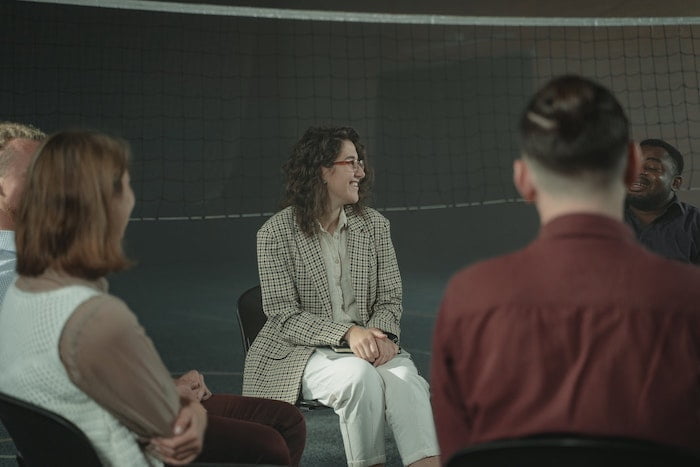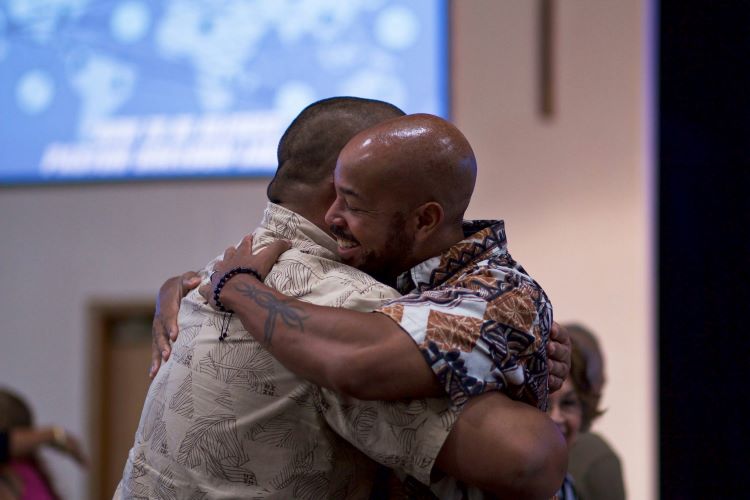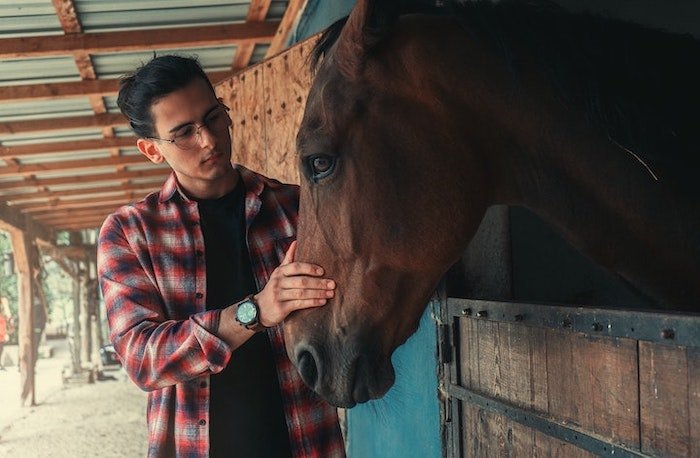Equine Therapy for Addiction
You might associate horses with childhood hobby riding, obstacle courses, cavalry soldiers, or even Winston Churchill, but equine therapy has also shown to be effective in treating mental health problems and addiction.
This includes:
- post-traumatic stress disorder
- major depressive disorder
- anxiety
- stroke recovery
- drug and alcohol misuse
Physical activity, using the senses, communication and feedback in the form of subtle interactions and behaviour, and the unconditional positive regard between horse and human during equine therapy during drug rehabilitation builds a healthy body and emotions.
Positive feelings from equine therapy include confidence, hope, positive feelings, mindfulness and overall wellbeing, and recovery.

Unlike psychotherapy which is generally used for people with mental health issues, equine therapy is a no-pressure treatment suitable for almost anyone. No prior knowledge or experience with horses is required.
Often people with addiction also have a mental disorder, and may have even turned to drinking or drug misuse as a form of self-medication.
Equine therapy treatment is suitable for patients who have a fear of horses, and there is no requirement to touch the horse if this action would negatively affect the individual.
The horses are generally not ridden during equine therapy treatment as sessions primarily involve brushing, cleaning or leading the horse by the reins.
The physical and emotional safety of both the patient and the horse during equine therapy is of utmost priority, and a horse handler will often be present during sessions to provide guidance and care.
Equine therapy is non-directive, meaning that the patient is encouraged to think for themselves and solve problems with minimal assistance which can increase confidence and communication skills.
Many people dealing with a substance or behavioural addiction have benefited immensely from equine therapy, and the advantages that come from this form of treatment can extend far beyond recovery.
Why are horses effective in therapy treatments?
Far from being randomly chosen, horses are specifically sought out in holistic therapy treatments due to their natures and specific abilities.
They can increase confidence, provide comfort and even act as a source of inspiration for many people dealing with a substance or behavioural addiction.
Some of the benefits of horses within therapy treatments include:
1. Horses reflect our emotions during equine therapy
Horses naturally have the ability to sense our emotions and intentions, an evolutionary trait developed out of necessity as they are primarily prey animals. They need to sense whether a situation is safe or if there is a chance that they may be in danger.
As a result, they are able to mirror our emotions back at us, even if this emotion is felt subconsciously. [1]
We may develop feelings of anxiety without realising, but a horse is able to pick up on the subtle cues that we are expressing through our body language and micro-expressions and will therefore react in an anxious manner.
Similarly, if we are calm and relaxed then the horse will naturally reflect these emotions and react accordingly.
This can be a useful guide for the therapist, and they will observe how the horse acts while in your presence.
2. Horses teach us how to self-soothe in equine therapy
Many horses are easily startled and will become fearful due to a number of factors including loud noises, quick movements and thunderstorms. However, they have the ability to self-soothe and can calm themselves down relatively quickly after a scare.
This can serve as inspiration to people dealing with addiction and others who struggle to contain their emotions, who will witness this behaviour and realise that it is possible to calm down after a strong negative reaction even without the use of substances or other detrimental actions.
3. They accept us unconditionally
A horse has no ulterior motives when attempting to forge a connection with a human being. They do not judge us on our appearance or our past behaviour, and will be patient if we are slow to understand how to carry out a particular task.
This unconditional acceptance can be a great relief to many people dealing with addiction, as they will often experience feelings of shame and a belief that they are unworthy of love.
It can boost confidence and increase the feeling of self-worth, two factors that are extremely beneficial to long-term recovery from addiction.
4. They want to create a bond
As a herd animal, horses naturally crave connection and will seek to create a bond when they feel comfortable and trusting. As above, forging and cultivating a bond with a horse can increase feelings of confidence and acceptance while increasing self-worth.
Horses also possess a calming and nurturing nature, often noticing signs of distress and attempting to soothe an upset human being while providing feelings of comfort.
This can be highly effective with people dealing with addiction, as they may not have previously felt worthy of care and affection.
What happens during an equine therapy session?
An equine therapy session is a supportive, non-judgmental environment in which your physical and emotional safety is prioritised along with that of the horse.
Depending on the type of treatment available, you may either be matched with your own horse or will share one with a small group of people.
The session will usually begin with a grooming activity – you will be encouraged to brush the horse, clean its hooves or braid the mane and tail. This can help you to get used to interacting with the animal and alleviate many fears around its size and temperament.
The remainder of the season will often consist of a number of activities including leading the horse over obstacles, saddling it or simply petting it.
You will be observed by a trained equine therapist throughout the entirety of the session, who will encourage you to communicate your feelings and speak to you about your experience.
In some cases, a professional horse handler will also be on hand to ensure your physical and emotional safety.
Which skills can equine therapy teach?

As well as providing a safe and supportive environment in which to heal from a substance or behavioural addiction, equine therapy teaches a number of skills that can be carried through the remainder of the patient’s life.
The simple act of grooming and carrying out activities with a horse can do wonders for a person’s physical, mental and emotional health, and mixing this with effective teamwork is a highly beneficial combination.
Some skills that equine therapy teaches include:
- Balancing emotions and the ability to self-soothe
- The subtle art of non-verbal communication
- Mindfulness and being present in the moment
- Setting appropriate boundaries
- Working with others as a team
- Building and maintaining trust in a relationship
- Confidence and becoming more assertive
- Connecting to humans and animals
- Overcoming mental and physical obstacles
- Building resilience
What kind of addictions and mental health disorders can equine therapy treat?

Equine therapy can provide many benefits to almost anyone but is particularly effective for individuals who are dealing with a substance or behavioural addiction.
An addiction can often cause people to lose confidence and isolate themselves from the world, and equine therapy can build this confidence back while encouraging communication and teamwork with others. [3]
Equine therapy for mental health disorders
As this form of treatment can also be beneficial to people dealing with a mental health disorder, it can also help individuals who are dealing with a co-occurring disorder.
If you are dealing with any of the below issues, you may find equine therapy to be extremely beneficial.
- Post-traumatic stress disorder (PTSD)
- Attention-deficit hyperactivity disorder (ADHD)
- Eating disorders
- Behavioural problems
- Major depressive disorder
- Anxiety
- Depression
Equine therapy for drug and alcohol misuse
- Substance misuse and addiction – heroin, cocaine, crystal meth
- Alcohol use disorder – binge drinking, alcohol dependency and addiction
- Behavioural addictions – porn, gambling
How does equine therapy treat addiction?

While equine therapy may not immediately spring to mind when considering treatment options for addiction recovery, it provides a number of benefits that can be extremely effective for anyone dealing with a substance or behavioural addiction.
Some advantages of equine therapy include:
1. Equine therapy increases confidence
At the start of equine therapy treatment, many patients have little experience with horses and some may even be afraid of them.
By slowly learning how to groom and interact with these animals, something that many of them believed they would not be able to do, their confidence naturally increases and they may feel capable of taking on even larger tasks.
The accepting and nurturing nature of the horses can also help to build confidence, increasing feelings of self-worth and showing patients that they are worthy of love and care. [2]
2. Equine therapy increases communication

The nature of addiction can be isolating, with many people choosing to withdraw from society and cut off friends and family.
Becoming part of a small team during equine therapy can be a safe and supportive place to relearn the act of communication with others and provide a social setting where patients are able to interact with others once again.
3. Calm and relaxing
Spending time with a horse and learning to groom and brush it effectively can be an extremely calming and mindful activity.
Many patients feel soothed by the repetitiveness of brushing along with the nature of the horse, and equine therapy can be a healthy and relaxing escape from the stresses of daily life.
4. Builds trust
Many people dealing with addiction have been hurt in the past, and as a result, have difficulty trusting others. Similarly, a horse will naturally be a little wary of a new human at first introduction.
Forging and building a level of trust between human and horse can be extremely healing, reminding the individual just how good it feels to trust and be trusted.
If you believe that you may benefit from equine therapy, get in touch with our team at OK Rehab today.
We can direct you to the most effective equine therapy treatment programmes in the UK, taking your lifestyle, budget and any other factors into account to provide the best addiction recovery treatment possible.
References
[1] https://www.animalsandsociety.org/wp-content/uploads/2016/04/klontz.pdf
[2] https://www.ncbi.nlm.nih.gov/pmc/articles/PMC6917924/
[3] https://www.ncbi.nlm.nih.gov/pmc/articles/PMC5054942/









